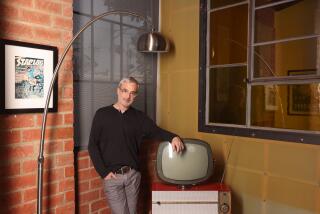Patient Approach Reveals PBS’ ‘Hawking’s Universe’
- Share via
In the 1950’s science-fiction classic, “Invaders From Mars,” lumbering, 7-foot guys in bad green jumpsuits are ordered about, silently, by an immobile telepathic being. It is obvious that, in contrast to his flock of giants and Earthlings alike, this pure, intellectual entity is the ultimate mental superior--his penetrating eyes at once conveying intelligence and patience for the rest of us.
Physicist-legend Stephen Hawking displays that same patience with all of us who watch the six-part series, “Stephen Hawking’s Universe,” which premieres tonight on PBS. But it is clear that Hawking--immobilized by Lou Gehrig’s disease and speaking through a computerized voice that responds to his fingered commands--is way smarter than we are. Indeed, he may be the smartest person on the planet, if not the universe (although the series also makes a case for Princeton’s Ed Witten).
Fortunately, Hawking has decided to use at least part of his brain power to educate the rest of us, picking up the mantle of the late Carl Sagan, who brought us the “Cosmos” series in 1980.
The subject Hawking has chosen to teach us? Everything.
From the beginning of the universe (if there was a beginning) to its inevitable end (don’t worry, Hawking tells us, it’s a few billion years off); from subatomic particles to massive stars; from Copernicus and Galileo to Einstein to Hawking and Witten, there is a lot to chew on in this universe. But don’t try washing it down with any beers--you’re going to need all the brain cells you have.
Hawking and his starry gathering of scientists make it as comfortable as possible for us, while at the same time resisting talking down to their audience. Imaginative cinematography and a pleasing--at times ominous--musical score also add to the palatability of this six-course feast of knowledge.
Throughout each of the installments, several themes pop up repeatedly: Misfortune can breed genius, unpopular ideas can have the best chance of breaking new scientific ground and this chap Einstein had a lot on the ball.
Galileo, we see in Part 1, came to some of his most enlightening conclusions during the decade or more he spent under house arrest by the Vatican for publishing Copernicus’ theories about the sun--and not the Earth--being the center of our solar system. Hawking, who notes he was “born 300 years to the day after Galileo died,” himself has risen to the loftiest of intellectual heights while living with one of the most debilitating neurological diseases known.
*
But Hawking, like all great thinkers, thinks of things other than himself. He is far too busy wondering what will happen to the rest of us, or rather our descendants way, way down the road.
The clues lie in the past, beginning with the Big Bang--the sudden, massive explosion that created the universe, a theory that is now accepted by scientists universally. The series takes us through decades of exciting searches for proof of the Big Bang, culminating several years ago when UC Berkeley’s George Smoot nailed down the final proof by spying telltale glimpses of the universe as it was 15 billion years ago.
But as Hawking states so eloquently, “Knowing how the universe works is not enough to tell us why it exists. To find the answer to that would be to know the mind of God.”
No one claims to do that in this series--which has a companion book, “Hawking’s Universe” (Basic Books). But Albert Einstein seems to have come as close as anyone. Einstein’s famous equation, E=mc2 crops up time and time again, tying together the workings of the universe with the smallest particles known to humans.
Hawking and others are turning their attention now to a “theory of everything,” which would basically do exactly what it says--reconciling particle physics with the big picture of the universe.
Russian scientist Andrei Linde, now at Stanford, is among those looking for such ultimate answers. About 10 years ago, Linde was so frustrated in his search that he didn’t get out of his bed for a month. Then he got a call to present a paper at a meeting in Italy. In half an hour, he devised an elegant theory of a self-reproducing universe. It was brilliant, if he must say so himself.
“Since then, there has been no depression,” and no new theory, Linde laments. “That may be unfortunate.”
One can’t help but wonder if Galileo’s imprisonment, Linde’s depression and Hawking’s physical disability might not be some kind of grand plan to nurture their genius and advance the human species. But, as Hawking says, knowing that would be “to know the mind of God.”
* “Stephen Hawking’s Universe” airs Mondays at 9 p.m. on KCET-TV (Channel 28).
More to Read
The complete guide to home viewing
Get Screen Gab for everything about the TV shows and streaming movies everyone’s talking about.
You may occasionally receive promotional content from the Los Angeles Times.






